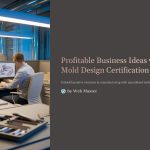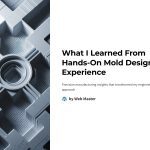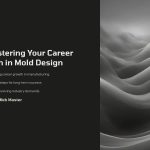 In today’s rapidly evolving manufacturing industry, mold design professionals play a pivotal role in shaping the quality and efficiency of production processes. As the backbone of sectors like automotive, electronics, and consumer goods, the expertise of mold designers directly influences product innovation and market competitiveness. For professionals in this field, charting a clear and strategic career development roadmap is not just beneficial—it’s essential. This guide delves into the critical steps and considerations for mold design practitioners aiming to advance their careers, adapt to industry changes, and achieve long-term success.
In today’s rapidly evolving manufacturing industry, mold design professionals play a pivotal role in shaping the quality and efficiency of production processes. As the backbone of sectors like automotive, electronics, and consumer goods, the expertise of mold designers directly influences product innovation and market competitiveness. For professionals in this field, charting a clear and strategic career development roadmap is not just beneficial—it’s essential. This guide delves into the critical steps and considerations for mold design practitioners aiming to advance their careers, adapt to industry changes, and achieve long-term success.

Understanding the Role of a Mold Design Professional
Mold design professionals are responsible for creating molds used in manufacturing processes to produce consistent and precise products. Their expertise ensures that products meet quality standards, are cost-effective to produce, and are manufactured efficiently. Key responsibilities include:
- Designing Molds: Utilizing CAD software to create detailed mold designs.
- Material Selection: Choosing appropriate materials for mold construction based on product requirements.
- Collaboration: Working with product designers and engineers to ensure mold designs align with product specifications.
- Troubleshooting: Identifying and resolving issues in the mold design and manufacturing process.
Understanding these responsibilities is the foundation for developing a successful career in mold design.

Building a Strong Educational Foundation
A solid educational background is crucial for a career in mold design. Relevant educational paths include:
- Associate or Bachelor’s Degree in Mechanical Engineering: Provides foundational knowledge in design principles and manufacturing processes.
- Specialized Training Programs: Institutions like the Korea Institute of Mold Technology offer programs focused on mold design and manufacturing. citeturn0search2
Continuous learning through workshops, certifications, and advanced courses is also essential to stay updated with industry advancements.

Gaining Practical Experience
Hands-on experience is invaluable in mold design. Strategies to acquire practical experience include:
- Internships: Participating in internships during or after formal education to apply theoretical knowledge in real-world settings.
- Entry-Level Positions: Starting in roles such as junior mold designer or CAD technician to build experience.
- Mentorship: Seeking guidance from experienced professionals to gain insights and advice.
Practical experience enhances problem-solving skills and technical proficiency, which are critical for career advancement.

Developing Essential Skills
To excel in mold design, professionals should focus on developing the following skills:
- Technical Proficiency: Mastery of CAD software and understanding of manufacturing processes.
- Attention to Detail: Ensuring precision in designs to meet exact specifications.
- Problem-Solving: Ability to identify issues and develop effective solutions.
- Communication: Collaborating effectively with cross-functional teams.
Investing in skill development through continuous learning and practice is key to career growth.

Navigating Career Advancement Opportunities
Advancing in a mold design career involves strategic planning and proactive efforts:
- Continuing Education: Pursuing advanced degrees or certifications to enhance expertise.
- Networking: Joining professional organizations and attending industry events to connect with peers and leaders.
- Portfolio Development: Compiling a portfolio showcasing successful projects and designs.
- Leadership Skills: Developing leadership abilities to take on managerial roles.
By focusing on these areas, professionals can position themselves for promotions and new opportunities.

Adapting to Industry Trends and Innovations
The manufacturing industry is continually evolving with new technologies and methodologies. Staying abreast of these changes is crucial:
- Embracing Technology: Learning about advancements such as 3D printing and automation in mold design.
- Sustainable Practices: Incorporating eco-friendly materials and processes in designs.
- Global Perspectives: Understanding international standards and practices to work in global markets.
Adaptability ensures long-term success and relevance in the field.
*Capturing unauthorized images is prohibited*




